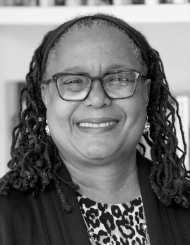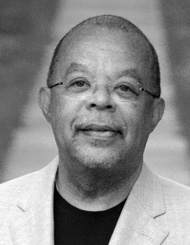-
Who’s Black and Why?: A Hidden Chapter from the Eighteenth-Century Invention of Race
Price $29.95Hardcover
Special Order

Henry Louis Gates, Jr. and Andrew S. Curran at the Brattle Theatre
presenting
Who's Black and Why?:
A Hidden Chapter from the Eighteenth-Century Invention of Race
in conversation with EVELYNN HAMMONDS
DateMar
31
Thursday
March 31, 2022 6:00 PM ET (Doors at 5:30) |
LocationBrattle Theatre
40 Brattle St., Cambridge, MA 02138 |
Tickets
$32.00 (book included)
$6.00 (admission only)
|
Harvard Book Store welcome preeminent scholar, literary critic, and filmmaker HENRY LOUIS GATES, JR. and leading Enlightenment scholar ANDREW S. CURRAN for a discussion of their co-edited book, Who’s Black and Why?: A Hidden Chapter from the Eighteenth-Century Invention of Race. They will be joined in conversation by EVELYNN HAMMONDS, the Barbara Gutmann Rosenkrantz Professor of the History of Science at Harvard University.
A Return to In-Person Events
Harvard Book Store is excited to re-introduce in-person programming this season, beginning this March. To ensure the safety and comfort of everyone in attendance, the following Covid-19 safety protocols will be in place at all of our Brattle Theatre events until further notice:
- Face coverings are required of all staff and attendees when inside the venue. Masks must snugly cover nose and mouth. At venues where refreshments are served, attendees may briefly unmask when actively eating or drinking.
- Proof of vaccination is required for entry into the venue. No exceptions. (Harvard Book Store staff will be checking vaccine cards and/or vaccine passports at the door.)
- Attendance is capped so as to allow for some social distancing in the venue.
For the time being, we will not be holding author signings at these events, in order to limit close contact. When possible, we will have a pre-signed books available for purchase on-site.
Ticketing
There are two ticket options available for this event.
Book-Included Ticket: Includes admission for one and one copy of Who's Black and Why?.
Admission-Only Ticket: Includes admission for one.
About Who's Black and Why?
In 1739 Bordeaux’s Royal Academy of Sciences announced a contest for the best essay on the sources of “blackness.” What is the physical cause of blackness and African hair, and what is the cause of Black degeneration, the contest announcement asked. Sixteen essays, written in French and Latin, were ultimately dispatched from all over Europe. The authors ranged from naturalists to physicians, theologians to amateur savants. Documented on each page are European ideas about who is Black and why.
Looming behind these essays is the fact that some four million Africans had been kidnapped and shipped across the Atlantic by the time the contest was announced. The essays themselves represent a broad range of opinions. Some affirm that Africans had fallen from God’s grace; others that blackness had resulted from a brutal climate; still others emphasized the anatomical specificity of Africans. All the submissions nonetheless circulate around a common theme: the search for a scientific understanding of the new concept of race. More important, they provide an indispensable record of the Enlightenment-era thinking that normalized the sale and enslavement of Black human beings.
These never previously published documents survived the centuries tucked away in Bordeaux’s municipal library. Translated into English and accompanied by a detailed introduction and headnotes written by Henry Louis Gates, Jr., and Andrew Curran, each essay included in this volume lays bare the origins of anti-Black racism and colorism in the West.
Praise for Who's Black and Why?
“In 1741 the Royal Academy of Bordeaux (a city of slave-trading wealth) sought the essence of human Blackness: in the climate, in the blood, in the bile, in the semen, in divine providence and the curse of Ham, in the size of the pores, or in ‘tubes’ in the skin. Now, after some 300 years of frustrating searches, definitive answers still elude us. Who’s Black and Why? reveals how prestigious natural scientists once sought physical explanations, in vain, for a social identity that continues to carry enormous significance to this day.” —Nell Irvin Painter, author of The History of White People
“The eighteenth-century essays published for the first time in Who’s Black and Why? contain a world of ideas—theories, inventions, and fantasies—about what blackness is, and what it means. To read them is to witness European intellectuals, in the age of the Atlantic slave trade, struggling, one after another, to justify atrocity.” —Jill Lepore, author of These Truths
“An indispensable book for anyone who is interested in the origins of racism. In this essential volume, Gates and Curran reveal how science itself played a major role in the construction of race during the eighteenth century.” —David Diop, author of the Booker Prize–winning At Night All Blood Is Black
Walking from the Harvard Square T station: 10 minutes
As you exit the station, cross Mass. Ave. and proceed along Brattle St. Follow Brattle St. as it curves to the right in Brattle Square (follow the sidewalk on the right side of the street). The Brattle will be on the left-hand side of the street. The building is shared with Algiers Cafe and Alden & Harlow Restaurant, and the theatre entrance is on the left side of the building—look for the sidewalk poster case and marquee.
(617) 661-1515
info@harvard.com
Media Inquiries
mediainquiries@harvard.com
Accessibility Inquiries
access@harvard.com
Classic Totes
Tote bags and pouches
in a variety of styles,
sizes, and designs, plus mugs, bookmarks, and more!
Shipping & Pickup
We ship anywhere in the U.S. and orders of $75+ ship free via media mail!
Learn More »Noteworthy Signed Books: Join the Club!
Join our Signed First Edition Club (or give a gift subscription) for a signed book of great literary merit, delivered to you monthly.
Learn More »











